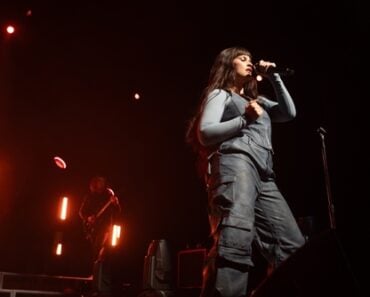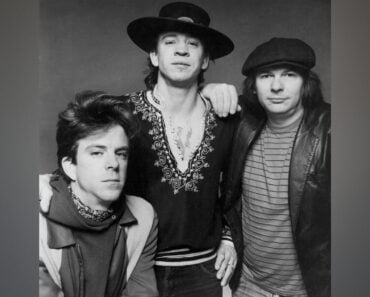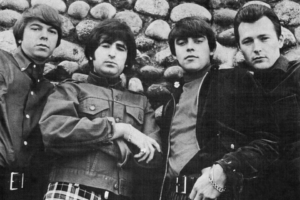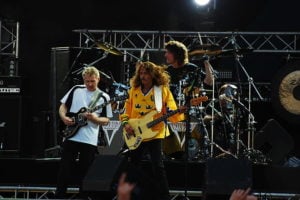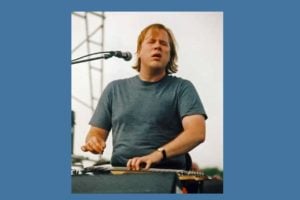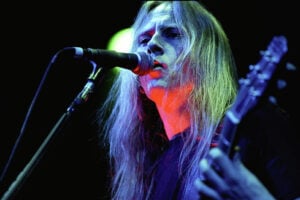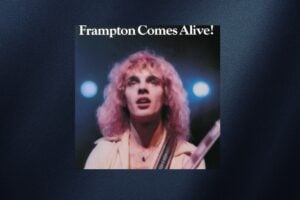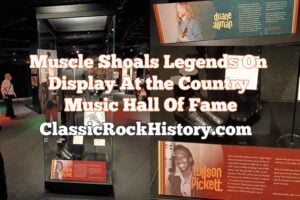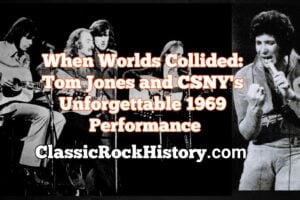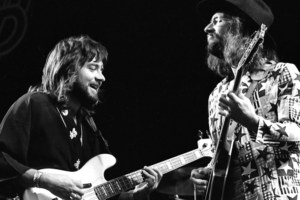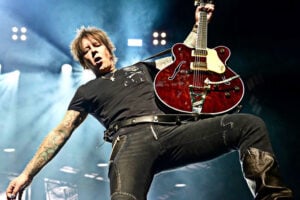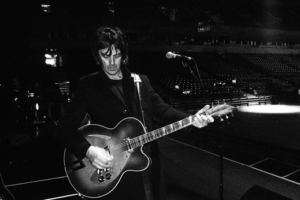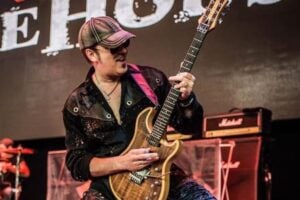
Feature Photo: Frank Schwichtenberg, CC BY-SA 4.0 <https://creativecommons.org/licenses/by-sa/4.0>, via Wikimedia Commons
John Mayall & the Bluesbreakers came together in February 1963, serving as a launching pad for numerous musicians who would later achieve their own fame. The band operated under the Bluesbreakers name until 1968, after which Mayall continued performing as a solo artist with various lineups until his death in July 2024. Throughout this 61-year period, the band and Mayall’s subsequent groups recorded over 50 studio albums and featured more than 100 different musicians across multiple configurations.
The original Bluesbreakers disbanded in 1968 when Mayall relocated to Los Angeles, though he briefly reformed the group in 1982 for a reunion tour with former members. After retiring the Bluesbreakers name in November 2008, Mayall continued touring and recording with his solo band until 2024. The band’s most commercially successful period occurred during the mid-1960s, with the 1966 album Blues Breakers with Eric Clapton reaching number six on the UK Albums Chart. Notable alumni who achieved significant fame after their tenure include Eric Clapton, Peter Green, Mick Fleetwood, John McVie, Mick Taylor, Jack Bruce, and Aynsley Dunbar.
The band underwent numerous personnel changes throughout its existence, with Mayall being the only constant member. The Bluesbreakers and Mayall’s subsequent groups served as an incubator for British blues rock musicians during the 1960s and maintained an active recording and touring schedule through multiple decades. The final lineup consisted of Mayall, bassist Greg Rzab, drummer Jay Davenport, and guitarist Carolyn Wonderland.
John Mayall
John Mayall founded the Bluesbreakers in February 1963 after relocating from Macclesfield to London. Originally from Macclesfield, he served as the band’s vocalist, keyboardist, and harmonica player throughout its entire existence. Mayall appeared on every album released under both the Bluesbreakers name and his solo career, from the earliest singles in 1964 through Nobody Told Me in 2019. He occasionally played rhythm guitar and contributed to the band’s songwriting throughout his career. Mayall disbanded the Bluesbreakers in 1968 when he moved to Los Angeles and continued performing as a solo artist for the remainder of his career. He briefly reformed the Bluesbreakers name in 1982 for a reunion tour before retiring the name permanently in November 2008. His final lineup included bassist Greg Rzab, drummer Jay Davenport, and guitarist Carolyn Wonderland. Mayall died in July 2024, ending both his solo career and the legacy of the Bluesbreakers. Beyond leading his own groups, Mayall’s primary contribution to music was providing a platform for emerging blues musicians who would later achieve significant individual success.
John McVie
John McVie joined the Bluesbreakers as bassist in July 1963 when the first official lineup was introduced. He remained with the band through multiple configurations until September 1967, with brief interruptions including a month-long replacement by Jack Bruce in late 1965. McVie played on the band’s most commercially successful album, Blues Breakers with Eric Clapton, which reached number six on the UK Albums Chart in 1966. He also contributed to A Hard Road in 1967 and Crusade in 1967 before leaving to form Fleetwood Mac with former bandmates Peter Green and Mick Fleetwood. McVie returned briefly for the 1982 Bluesbreakers reunion tour and appeared on the resulting live releases Blues Alive and The 1982 Reunion Concert. He also made guest appearances on A Banquet in Blues in 1976 and Along for the Ride in 2001. Outside the Bluesbreakers, McVie achieved international fame as the bassist for Fleetwood Mac, contributing to some of the best-selling albums in rock history including Rumours.
Bernie Watson
Bernie Watson served as the Bluesbreakers’ first official lead guitarist when the lineup was introduced in July 1963. He remained with the band until April 1964 and played on the group’s first single, “Crawling Up a Hill,” released in 1964. Watson was replaced by Roger Dean shortly before the single’s release. No significant information about his subsequent career is provided in the available records.
Peter Ward
Peter Ward was the Bluesbreakers’ first official drummer when the lineup was introduced in July 1963. He left the band shortly after its formation and did not appear on any recorded releases. Ward was replaced by Martin Hart following his brief tenure with the group.
Martin Hart
Martin Hart replaced Peter Ward as the Bluesbreakers’ drummer shortly after the band’s formation in 1963. He remained with the group through April 1964 and played on the band’s first single, “Crawling Up a Hill,” in 1964. Hart was replaced by Hughie Flint in April 1964, shortly before the release of the single.
Hughie Flint
Hughie Flint joined the Bluesbreakers as drummer in April 1964, replacing Martin Hart. He remained with the band until September 1966, playing on Blues Breakers with Eric Clapton in 1966 and contributing to the singles “Crocodile Walk” and “I’m Your Witchdoctor” in 1965. Flint also appeared on John Mayall Plays John Mayall in 1965 and the archival release Looking Back. He left the band in September 1966 and was replaced by Aynsley Dunbar. Flint returned for the 1982 Bluesbreakers reunion, filling in for Colin Allen at four warm-up shows in December before the Australian tour began. His post-Bluesbreakers career details are not extensively documented in the available material.
Roger Dean
Roger Dean replaced Bernie Watson as lead guitarist in April 1964 and remained with the band until April 1965. He played on John Mayall Plays John Mayall in 1965 and the single “Crocodile Walk” in 1965. Dean was replaced by Eric Clapton when the guitarist made his debut with the group on April 9, 1965. Dean died in 2008.
Eric Clapton
Eric Clapton joined the Bluesbreakers as lead guitarist on April 9, 1965, replacing Roger Dean. He left abruptly in September 1965 to form a new band and tour Greece but returned in November of that year. Clapton remained until July 17, 1966, when he departed the day after forming Cream. During his tenure, he played on Blues Breakers with Eric Clapton, which became one of the band’s most successful albums and reached number six on the UK Albums Chart. He also contributed to the singles “I’m Your Witchdoctor” in 1965 and “Lonely Years” in 1966. Clapton made guest appearances on Back to the Roots in 1971 and the 70th Birthday Concert in 2003. He provided both lead guitar and backing vocals during his time with the band, occasionally taking lead vocal duties. After leaving the Bluesbreakers, Clapton achieved international fame as a guitarist with Cream, Blind Faith, Derek and the Dominos, and as a solo artist, becoming one of the most commercially successful and critically acclaimed guitarists in rock history.
John Weider
John Weider briefly filled in as lead guitarist during Eric Clapton’s absence in September 1965. His tenure with the band was extremely short and he did not appear on any recorded releases. Details about his subsequent career are not extensively documented in the available material.
John Slaughter
John Slaughter served as a temporary lead guitarist during Eric Clapton’s absence in September 1965. Like John Weider, his time with the band was brief and he did not contribute to any recorded releases.
Geoff Krivit
Geoff Krivit filled in as lead guitarist during Eric Clapton’s absence in October 1965. His tenure with the Bluesbreakers was brief and he did not appear on any recorded releases. Krivit died in 2022.
Peter Green
Peter Green first joined the Bluesbreakers as a temporary replacement for Eric Clapton in October 1965, playing for approximately one week. He returned in July 1966 after Clapton left to form Cream and remained until June 1967. During his second stint, Green played on A Hard Road in 1967 and contributed to several singles including “Looking Back” in 1966 and “Sitting in the Rain” in 1967. He also appeared on the live releases Live in 1967 released in 2015. Green provided both lead guitar and backing vocals, occasionally handling lead vocal duties. He left the Bluesbreakers in June 1967 after being fired, subsequently forming Fleetwood Mac with fellow former Bluesbreaker Mick Fleetwood. Green also made a guest appearance on Blues from Laurel Canyon in 1968 and Along for the Ride in 2001. After leaving the Bluesbreakers, Green achieved significant success as the founder and guitarist of Fleetwood Mac, writing several of the band’s early hits. He died in 2020.
Jack Bruce
Jack Bruce briefly replaced John McVie on bass in October 1965, staying for approximately one month before McVie returned to the band. Despite his short tenure, Bruce appeared on the archival release Looking Back in 1969 and Primal Solos in 1977, specifically on the track “Stormy Monday.” After leaving the Bluesbreakers, Bruce achieved international fame as the bassist and vocalist for Cream, performing alongside former Bluesbreaker Eric Clapton. Bruce died in 2014.
Aynsley Dunbar
Aynsley Dunbar joined the Bluesbreakers as drummer in September 1966, replacing Hughie Flint. He remained with the band until April 1967 and played on A Hard Road in 1967. Dunbar also contributed to several singles released between “Looking Back” in 1966 and “Curly” in 1967. He was replaced by Micky Waller in April 1967. After leaving the Bluesbreakers, Dunbar went on to play with numerous prominent rock bands including The Jeff Beck Group, Frank Zappa’s Mothers of Invention, Journey, and Whitesnake, establishing himself as a highly sought-after session and touring drummer.
Micky Waller
Micky Waller replaced Aynsley Dunbar as drummer in April 1967 but his tenure was extremely brief. He was replaced by Mick Fleetwood after only a short period and did not appear on any recorded releases with the band. Waller died in 2008.
Mick Fleetwood
Mick Fleetwood joined the Bluesbreakers as drummer in April 1967, replacing Micky Waller. He remained with the band until June 1967 when he was fired after two months. During his brief tenure, Fleetwood played on the single “Double Trouble” in 1967 and contributed to the live releases Live in 1967 released in 2015. He also made a guest appearance on Along for the Ride in 2001. After being fired from the Bluesbreakers, Fleetwood followed Peter Green to form Fleetwood Mac, where he served as the drummer and one of the band’s namesakes. He remained with Fleetwood Mac throughout its entire history, overseeing the band through numerous lineup changes and achieving massive commercial success, particularly during the band’s late 1970s peak.
Keef Hartley
Keef Hartley joined the Bluesbreakers as drummer in June 1967, replacing Mick Fleetwood. His initial tenure lasted until April 1968 when the band underwent significant restructuring. Hartley played on Crusade in 1967 and The Blues Alone in 1967, as well as The Diary of a Band volumes one and two in 1968. He returned to the band for two additional periods: briefly in 1971 when he contributed to Back to the Roots, and again from June 1972 to early 1974 when he played on Ten Years Are Gone in 1973. During his third stint, he also appeared on the live albums Live in Europe and Moving On in 1972. Hartley contributed to several singles including “Suspicions” in 1967. He died in 2011.
Mick Taylor
Mick Taylor joined the Bluesbreakers as lead guitarist in June 1967, replacing Peter Green. He remained with the band until June 5, 1969, when he left to replace Brian Jones in The Rolling Stones. During his tenure, Taylor played on Crusade in 1967, Bare Wires in 1968, and Blues from Laurel Canyon in 1968. He also contributed to The Diary of a Band volumes one and two in 1968. Taylor relocated to Los Angeles with Mayall in August 1968 after the Bluesbreakers disbanded, continuing to work with him as a solo artist until joining The Rolling Stones. He returned for the 1982 Bluesbreakers reunion tour, which resulted in the live releases Blues Alive in 1983 and Return of the Bluesbreakers in 1985. Taylor continued working with Mayall sporadically through early 1984 before departing again. He also appeared as a guest on Back to the Roots in 1971, Along for the Ride in 2001, and the 70th Birthday Concert in 2003. After leaving Mayall’s band, Taylor achieved international recognition as the lead guitarist for The Rolling Stones from 1969 to 1974, contributing to several of the band’s most critically acclaimed albums.
Chris Mercer
Chris Mercer joined the Bluesbreakers in 1967 as a saxophonist when Mayall expanded the group’s lineup. He played tenor and baritone saxophone and remained with the band until 1968. Mercer contributed to Crusade in 1967 and Bare Wires in 1968, as well as The Diary of a Band volumes one and two in 1968. He also appeared on the single “Suspicions” in 1967 and the live album Live in Europe released in 1971. Mercer left the band in 1968 shortly after the release of Bare Wires.
Rip Kant
Rip Kant joined the Bluesbreakers as a baritone saxophonist in June 1967 when the band expanded to include horn players. He remained with the group only briefly, being replaced by Dick Heckstall-Smith in August 1967. Kant played on Crusade in 1967 before his departure.
Terry Edmonds
Terry Edmonds briefly joined the Bluesbreakers as a rhythm guitarist in June 1967 but left after only a few weeks. He did not appear on any recorded releases with the band.
Dick Heckstall-Smith
Dick Heckstall-Smith joined the Bluesbreakers in August 1967, replacing Rip Kant on saxophone. He played tenor, soprano, and baritone saxophone and remained with the band until 1968. Heckstall-Smith contributed to Bare Wires in 1968, The Diary of a Band volumes one and two in 1968, and the single “Suspicions” in 1967. He also appeared on the live album Live in Europe released in 1971. Heckstall-Smith left Mayall’s band along with Tony Reeves and Jon Hiseman to form Colosseum, a progressive jazz-rock group. He also made a guest appearance on Along for the Ride in 2001. Heckstall-Smith died in 2004.
Paul Williams
Paul Williams replaced John McVie on bass for approximately one month in 1967. He appeared on one track on The Diary of a Band, Vol. 2 in 1968 and played on the single “Suspicions” in 1967. Williams died in 2019.
Keith Tillman
Keith Tillman replaced Paul Williams on bass in late 1967 and remained with the band until early 1968. He played on The Diary of a Band volumes one and two in 1968. Tillman was replaced by Andy Fraser for approximately one month in 1968 before Fraser joined the band Free.
Henry Lowther
Henry Lowther joined the Bluesbreakers in February 1968 as the band’s first trumpeter, also playing cornet and violin. He remained with the band until mid-1968, playing on Bare Wires in 1968. Lowther appeared on the single “Looking Back” in 1966 through archival recordings. He left the band when Mayall disbanded the Bluesbreakers after the Bare Wires tour. Lowther made a guest appearance at the 70th Birthday Concert in 2003.
Andy Fraser
Andy Fraser replaced Keith Tillman on bass in March 1968 but remained with the band for only approximately one month. He did not appear on any recorded releases during his brief tenure. Fraser left the Bluesbreakers to join the band Free, where he achieved significant success as their bassist and contributed to writing several of the band’s hits including “All Right Now.” Fraser died in 2015.
Tony Reeves
Tony Reeves replaced Andy Fraser on bass in April 1968 and remained with the band until mid-1968. He played both bass and double bass and contributed to Bare Wires in 1968, which was the last studio album to bear the Bluesbreakers name. Reeves left Mayall’s band along with Jon Hiseman and Dick Heckstall-Smith to form Colosseum shortly after the album’s release.
Jon Hiseman
Jon Hiseman joined the Bluesbreakers as drummer in April 1968, replacing Keef Hartley. He played drums and percussion and remained with the band until mid-1968. Hiseman contributed to Bare Wires in 1968 before leaving to form Colosseum with Tony Reeves and Dick Heckstall-Smith. He died in 2018.
Steve Thompson
Steve Thompson joined Mayall’s band as bassist in August 1968 after the Bluesbreakers disbanded and Mayall relocated to Los Angeles. He remained until early 1970 during Mayall’s first solo period. Thompson played on Blues from Laurel Canyon in 1968, Empty Rooms in 1970, and contributed one track to Back to the Roots in 1971. He also appeared on The Turning Point in 1969 and the live release Live at the Marquee 1969. Thompson returned for two additional stints with Mayall’s band from 1977 to 1978 and again in 1983. During his second tenure, he played on A Hard Core Package in 1977 and The Last of the British Blues in 1978.
Colin Allen
Colin Allen joined Mayall’s band as drummer in August 1968 after the Bluesbreakers disbanded. He played drums and tabla and remained until June 1969. Allen contributed to Blues from Laurel Canyon in 1968 before leaving when Mick Taylor departed to join The Rolling Stones. He returned for the 1982 Bluesbreakers reunion tour, replacing Hughie Flint for the main tour dates. During this reunion period, Allen played on Blues Alive in 1983, Return of the Bluesbreakers in 1985, and The 1982 Reunion Concert released in 1992. Allen remained with the reunited Bluesbreakers through early 1983.
Jon Mark
Jon Mark joined Mayall’s band as an acoustic guitarist in June 1969 after Mick Taylor’s departure. He remained until August 1970 and played on The Turning Point in 1969 and Empty Rooms in 1970, as well as the live release Live at the Marquee 1969. Mark left the band to form the group Mark-Almond with fellow Mayall bandmate Johnny Almond. He made a guest appearance on A Banquet in Blues in 1976. Mark died in 2021.
Johnny Almond
Johnny Almond joined Mayall’s band in 1969 as a multi-instrumentalist, playing tenor, alto, and baritone saxophone as well as flute. He remained until August 1970 and contributed to The Turning Point in 1969 and Empty Rooms in 1970, as well as the live release Live at the Marquee 1969. Almond left with Jon Mark to form the group Mark-Almond. He also made guest appearances on A Banquet in Blues in 1976 and appeared on archival tracks from earlier sessions that were released on Blues Breakers with Eric Clapton and A Hard Road. Almond died in 2009.
Alex Dmochowski
Alex Dmochowski replaced Steve Thompson on bass in early 1970 and remained until August of that year. He did not appear on any major album releases during his tenure but made a guest appearance on A Banquet in Blues in 1976.
Anthony “Duster” Bennett
Anthony “Duster” Bennett joined Mayall’s band as a harmonica player in early 1970 and remained until August 1970. He did not appear on any recorded releases during his brief tenure with the band. Bennett died in 1976.
Larry Taylor
Larry Taylor joined Mayall’s band as bassist in August 1970 and became one of the longest-tenured members during the 1970s. His initial stint lasted from August 1970 to late 1971, during which he played on USA Union in 1970, Back to the Roots in 1971, and Memories in 1971. Taylor returned for a second period from 1971 to 1973 and a third from 1974 to 1977. During these tenures, he contributed to numerous albums including Jazz Blues Fusion in 1972, Moving On in 1972, Ten Years Are Gone in 1973, The Latest Edition in 1974, New Year New Band New Company in 1975, Notice to Appear in 1975, and A Banquet in Blues in 1976. Taylor was a former member of Canned Heat before joining Mayall’s band and brought considerable experience as a bassist. He died in 2019.
Don “Sugarcane” Harris
Don “Sugarcane” Harris joined Mayall’s band in August 1970 as a violinist and backing vocalist. His initial tenure lasted until November 1970, during which he played on USA Union in 1970 and Back to the Roots in 1971. Harris returned for a second stint from 1974 to 1976, contributing to Ten Years Are Gone in 1973, New Year New Band New Company in 1975, Notice to Appear in 1975, and making a guest appearance on A Banquet in Blues in 1976. He also appeared on the archival release Cross Country Blues in 1992. Harris died in 1999.
Harvey Mandel
Harvey Mandel joined Mayall’s band as lead guitarist in August 1970 after leaving Canned Heat. He remained until early 1971 and played on USA Union in 1970 and Back to the Roots in 1971. Mandel returned for a brief period in 1979, though he pulled out of the tour early and was replaced by James Quill Smith. During his career, Mandel also worked with Canned Heat and appeared on several of their recordings before joining Mayall.
Paul Lagos
Paul Lagos joined Mayall’s band as drummer in November 1970 and remained until early 1971. He played on Back to the Roots in 1971, an album that featured numerous former bandmates returning for the recording sessions. Lagos died in 2009.
Gerry McGee
Gerry McGee joined Mayall’s band as lead guitarist and sitarist in early 1971. He remained for approximately one year during a period when Mayall downsized to a trio format. McGee played on Memories in 1971 and contributed two tracks to Back to the Roots. His tenure represented a shift toward a more stripped-down sound. McGee died in 2019.
Richard “Blue” Mitchell
Richard “Blue” Mitchell joined Mayall’s band as a trumpet and flugelhorn player in late 1971, marking a shift toward a more jazz-oriented sound. He remained until early 1974 and contributed to Jazz Blues Fusion in 1972, Moving On in 1972, and Ten Years Are Gone in 1973. Mitchell also appeared on A Banquet in Blues in 1976. His addition to the band represented Mayall’s increasing interest in incorporating jazz elements into his music. Mitchell died in 1979.
Freddie Robinson
Freddie Robinson joined Mayall’s band as lead guitarist in late 1971 and remained until early 1974. He played on Jazz Blues Fusion in 1972, Moving On in 1972, and Ten Years Are Gone in 1973. Robinson was part of the jazz-heavy lineup that marked a significant stylistic departure for Mayall’s music during this period. Robinson died in 2009.
Victor Gaskin
Victor Gaskin joined Mayall’s band initially in 1971 and returned for a longer tenure from 1972 to early 1974. He played both bass and double bass and contributed to Moving On in 1972 and Ten Years Are Gone in 1973. Gaskin was part of the jazz-fusion oriented lineup during this period. Gaskin died in 2012.
Fred Clark
Fred Clark joined Mayall’s band as a tenor saxophonist in 1971. He appeared on the live volume of Ten Years Are Gone and contributed to several tracks on the archival release Rock the Blues Tonight. Details about the length of his tenure are limited.
Clifford Solomon
Clifford Solomon joined Mayall’s band as a saxophonist in late 1971, playing both tenor and alto saxophone. He remained until mid-1972 and contributed to Jazz Blues Fusion in 1972 and Moving On in 1972. Solomon later made guest appearances on Blues for the Lost Days in 1997. Solomon died in 2004.
Ron Selico
Ron Selico joined Mayall’s band as drummer in late 1971 and remained until June 1972. He played drums and percussion and contributed to Jazz Blues Fusion in 1972. Selico was replaced by the returning Keef Hartley in June 1972.
Patrick “Putter” Smith
Patrick “Putter” Smith joined Mayall’s band as a second bassist and double bass player in early 1972. He remained for only a few months before being replaced by Victor Gaskin and did not appear on any recorded releases.
Ernie Watts
Ernie Watts joined Mayall’s band as a tenor saxophonist in mid-1972. He was part of an expanded lineup that briefly included four saxophonists for the live album Moving On in 1972. Watts remained until early 1974 as part of Mayall’s jazz-fusion period.
Charles Owens
Charles Owens joined Mayall’s band as a saxophonist and flutist in mid-1972. He played soprano saxophone and flute and was part of the expanded horn section that appeared on Moving On in 1972. Owens remained until early 1974.
Fred Jackson
Fred Jackson joined Mayall’s band as a saxophonist in mid-1972, playing both baritone and tenor saxophone. He was part of the expanded horn section for Moving On in 1972 and remained until early 1974.
James “Red” Holloway
James “Red” Holloway joined Mayall’s band as a saxophonist and flutist in 1973, replacing the four-saxophone lineup. He played tenor and alto saxophone as well as flute and remained until early 1974. Holloway contributed to the studio portion of Ten Years Are Gone in 1973 and The Latest Edition in 1974. He returned for a second stint from 1976 to 1977, playing on A Banquet in Blues in 1976 and appearing on the live album Lots of People in 1977. Holloway made several guest appearances on later albums including Blues for the Lost Days in 1997, Along for the Ride in 2001, and In the Palace of the King in 2007. Holloway died in 2012.
Soko Richardson
Soko Richardson joined Mayall’s band as drummer in early 1974 and became one of the more consistent members during the mid-to-late 1970s. He remained through multiple lineup changes until 1976, then returned for stints from 1977 to 1978 and again from 1980 to 1981. Richardson played drums and percussion and contributed to The Latest Edition in 1974, New Year New Band New Company in 1975, Notice to Appear in 1975, A Banquet in Blues in 1976, A Hard Core Package in 1977, and Road Show Blues in 1981. He also appeared on The Last of the British Blues in 1978. Richardson died in 2004.
Jesse Ed Davis
Jesse Ed Davis joined Mayall’s band as lead guitarist in early 1974 following Mayall’s recovery from a broken leg. He remained only briefly before being replaced by Randy Resnick and Hightide Harris. Davis did not appear on any recorded releases during his short tenure. Davis died in 1988.
Randy Resnick
Randy Resnick replaced Jesse Ed Davis as lead guitarist in 1974 and played on The Latest Edition released that year. His tenure with the band was relatively brief and limited to this period.
Hightide Harris
Hightide Harris joined Mayall’s band as a second guitarist alongside Randy Resnick in 1974. He played on The Latest Edition in 1974 before leaving the band. Harris also performed under the names Willie Boyd and Willie Gitry.
Jay Spell
Jay Spell joined Mayall’s band in 1974 as a keyboardist, also playing piano, clarinet, and synthesizers. He remained until 1977 and contributed to New Year New Band New Company in 1975, Notice to Appear in 1975, A Banquet in Blues in 1976, and appeared on the live album Lots of People in 1977. Spell died in 2010.
Rick Vito
Rick Vito joined Mayall’s band as lead guitarist in late 1974 and remained until 1976. He played on New Year New Band New Company in 1975, Notice to Appear in 1975, and A Banquet in Blues in 1976. Vito returned for a second stint from 1979 to 1980 as a rhythm guitarist, contributing to No More Interviews in 1979. After leaving Mayall’s band, Vito later joined Fleetwood Mac in the late 1980s.
Dee McKinnie
Dee McKinnie joined Mayall’s band as a vocalist in 1974 and remained until 1976. She contributed to New Year New Band New Company in 1975, Notice to Appear in 1975, and A Banquet in Blues in 1976. McKinnie was part of the lineup that featured multiple vocalists and represented Mayall’s experimentation with different vocal arrangements.
Pepper Watkins
Pepper Watkins joined Mayall’s band as a backing vocalist in 1976 and remained until 1977. She contributed to A Hard Core Package in 1977, Lots of People in 1977, and The Last of the British Blues in 1978. Watkins was part of an expanded touring lineup that featured multiple horn players and additional vocalists.
Ann Patterson
Ann Patterson joined Mayall’s touring band in 1976 as a multi-instrumentalist, playing alto saxophone, oboe, and flute. She appeared on A Hard Core Package in 1977 and the live album Lots of People in 1977. Patterson was part of the large ensemble that toured with Mayall during this period.
Gary Rowles
Gary Rowles joined Mayall’s band as lead guitarist in late 1976 and remained until early 1977. He appeared on the live album Lots of People in 1977. His tenure was relatively brief and marked the period before Mayall downsized the band again.
Frank Wilson
Frank Wilson joined Mayall’s touring band as drummer in late 1976 and appeared on the live album Lots of People in 1977. His tenure was part of the expanded lineup that featured numerous horn players and additional musicians.
Warren Bryant
Warren Bryant joined Mayall’s touring band as a percussionist in 1976. He appeared on the live album Lots of People in 1977 as part of the large ensemble touring lineup.
Jimmy Roberts
Jimmy Roberts joined Mayall’s touring band as a tenor saxophonist in 1976. He appeared on the live album Lots of People in 1977 as part of the expanded horn section.
David Majal Li
David Majal Li joined Mayall’s touring band as a baritone saxophonist in 1976. He appeared on the live album Lots of People in 1977 during the period when Mayall toured with a large ensemble.
Nolan Smith
Nolan Smith joined Mayall’s touring band as a trumpet player in 1976. He appeared on the live album Lots of People in 1977 as part of the expanded horn section.
Bill Lamb
Bill Lamb joined Mayall’s touring band in 1976, playing both trombone and trumpet. He appeared on the live album Lots of People in 1977 during the large ensemble touring period.
James Quill Smith
James Quill Smith joined Mayall’s band as lead guitarist in 1977 and remained through multiple stints until 1981. He played lead guitar and provided backing vocals, occasionally taking lead vocal duties. Smith contributed to A Hard Core Package in 1977, The Last of the British Blues in 1978, No More Interviews in 1979, and Road Show Blues in 1981. He initially left when Harvey Mandel joined in 1979 but returned when Mandel departed early from the tour. Smith died in 2018.
Maggie Parker
Maggie Parker joined Mayall’s band in 1979 as a vocalist and percussionist, later becoming Maggie Mayall after marrying John Mayall. She remained until 1981 and contributed to No More Interviews in 1979 and Road Show Blues in 1981. Parker returned decades later to contribute to Stories in 2002 and Tough in 2009.
Chris Mostert
Chris Mostert joined Mayall’s band in 1979 as a multi-instrumentalist, playing soprano and tenor saxophone as well as flute. He remained until 1980 and contributed to No More Interviews in 1979 and Road Show Blues in 1981.
Angus Thomas
Angus Thomas joined Mayall’s band as bassist in 1979, playing both bass and double bass. He remained until mid-1979 when the band lineup changed. Thomas contributed to No More Interviews in 1979 and came to the band as a member of Harvey Mandel’s backing ensemble. Thomas briefly toured with Mayall when Mandel brought his group to support the bandleader.
Rubén Alvarez
Rubén Alvarez joined Mayall’s band as drummer in 1979, playing drums and percussion. He came to the band as part of Harvey Mandel’s backing group and remained until mid-1979. Alvarez contributed to No More Interviews in 1979.
Chris Cameron
Chris Cameron joined Mayall’s band as a keyboardist in mid-1979, playing keyboards, piano, and synthesizers. He remained until 1980 and contributed to No More Interviews in 1979. Cameron was part of the expanded lineup during this period.
Kevin McCormick
Kevin McCormick joined Mayall’s band as bassist in 1980 and remained through multiple periods until 1983. He contributed to Road Show Blues in 1981 and Return of the Bluesbreakers in 1985. McCormick initially replaced John McVie in June 1982 during the reunion tour before being replaced himself by Steve Thompson later that year.
Mike Gardner
Mike Gardner joined Mayall’s band as drummer in 1981 for a brief period before the Bluesbreakers reunion. He returned from 1983 to 1984 and contributed to the studio tracks on Return of the Bluesbreakers in 1985 and Cross Country Blues in 1992.
Don McMinn
Don McMinn joined Mayall’s band as lead guitarist in mid-1981 for a brief period. He contributed to the studio tracks on Return of the Bluesbreakers in 1985. His tenure was short-lived and occurred during the period just before the 1982 reunion tour.
Bobby Manuel
Bobby Manuel joined Mayall’s band as rhythm guitarist in mid-1981 for a brief period. He contributed to the studio tracks on Return of the Bluesbreakers in 1985 alongside Don McMinn.
Jeff Davis
Jeff Davis joined Mayall’s band as bassist in mid-1981 for a brief period. He contributed to the studio tracks on Return of the Bluesbreakers in 1985 during the same short-lived lineup as Don McMinn and Bobby Manuel.
Tim Drummond
Tim Drummond joined Mayall’s band as bassist in 1983 and remained through mid-1984. He contributed to two tracks on Bottom Line in 1979 recorded with session musicians and A Sense of Place in 1990. Drummond toured with Mayall and Mick Taylor during this period. Drummond died in 2015.
Henry “Coco” Montoya
Henry “Coco” Montoya joined Mayall’s band as lead guitarist in 1984 and remained until 1993, making him one of the longest-serving guitarists in Mayall’s history. He played lead guitar and provided backing vocals, occasionally handling lead vocal duties. Montoya contributed to Chicago Line in 1988, A Sense of Place in 1990, Wake Up Call in 1993, and Cross Country Blues in 1992. He also appeared on Behind the Iron Curtain in 1985 and The Power of the Blues in 1987. Montoya left the band in 1993 to pursue a solo career, later achieving success as a blues guitarist under his own name. He made a guest appearance on Padlock on the Blues in 1999.
Bobby Haynes Sr.
Bobby Haynes Sr. joined Mayall’s band as bassist in 1984 and remained until 1990. He contributed to Chicago Line in 1988, A Sense of Place in 1990, and Cross Country Blues in 1992. Haynes also appeared on Behind the Iron Curtain in 1985 and The Power of the Blues in 1987. His tenure represented one of the more stable periods in Mayall’s band during the 1980s. Haynes died in 2018.
“Kal” David Raskin
“Kal” David Raskin joined Mayall’s band as a second lead guitarist alongside Coco Montoya in 1984. He remained until 1985 and contributed to Cross Country Blues in 1992 and the reissue bonus tracks for Return of the Bluesbreakers in 1993. Raskin died in 2022.
Willie McNeil
Willie McNeil joined Mayall’s band as drummer in 1984 and remained until 1985. He was replaced by Joe Yuele in 1985 and did not appear on any major recorded releases beyond his contributions to studio tracks later compiled on various releases.
Joe Yuele
Joe Yuele joined Mayall’s band as drummer in 1985 and remained until November 2008, making him the longest-serving drummer in Mayall’s history. He played drums and percussion and contributed to Chicago Line in 1988, A Sense of Place in 1990, and every album from Wake Up Call in 1993 through In the Palace of the King in 2007. Yuele also appeared on Behind the Iron Curtain in 1985, The Power of the Blues in 1987, UK Tour 2K in 2001, No Days Off in 2003, the 70th Birthday Concert in 2003, and Live from Austin TX in 2007. His departure in November 2008 coincided with Mayall’s decision to retire the Bluesbreakers name.
Walter Trout
Walter Trout joined Mayall’s band as lead guitarist in 1985 and remained until 1989. He played lead guitar, harmonica, and provided backing vocals. Trout contributed to Chicago Line in 1988, Behind the Iron Curtain in 1985, and The Power of the Blues in 1987. He left the Bluesbreakers in 1989 to pursue a solo career, releasing his debut album before the end of that year. Trout went on to establish himself as a successful solo blues guitarist and bandleader.
Daniel “Freebo” Friedberg
Daniel “Freebo” Friedberg replaced Bobby Haynes on bass in 1990. He contributed to three tracks on A Sense of Place in 1990 and later replaced Haynes on tour. Friedberg’s tenure was relatively brief as Rick Cortes took over on bass before the end of the year. Outside of Mayall’s band, Freebo worked as a session musician and toured with various artists.
Rick Cortes
Rick Cortes joined Mayall’s band as bassist in late 1990 and remained until 1996. He contributed to Wake Up Call in 1993 and Spinning Coin in 1995. Cortes was part of the lineup during the transition from Coco Montoya to Buddy Whittington on lead guitar.
Buddy Whittington
Buddy Whittington joined Mayall’s band as lead guitarist in 1993, replacing Coco Montoya. He remained until November 2008, making him one of the longest-serving lead guitarists in Mayall’s history. Whittington played lead guitar and provided backing vocals, occasionally handling lead vocal duties. He contributed to every album from Spinning Coin in 1995 through In the Palace of the King in 2007, including Blues for the Lost Days in 1997, Padlock on the Blues in 1999, Stories in 2002, and Road Dogs in 2005. Whittington also appeared on UK Tour 2K in 2001, No Days Off in 2003, and the 70th Birthday Concert in 2003. His departure in 2008 coincided with Mayall retiring the Bluesbreakers name.
John Paulus
John Paulus joined Mayall’s band as bassist in 1996, replacing Rick Cortes. He remained until 1999 and contributed to Blues for the Lost Days in 1997 and Padlock on the Blues in 1999. Paulus later joined Canned Heat, where he continued his career as a bassist.
Greg Rzab
Greg Rzab first joined Mayall’s band as bassist in 1999 for a European tour, replacing John Paulus. He left in 2000 to join The Black Crowes but returned in 2009 and remained with Mayall until the bandleader’s death in 2024. During his second tenure, Rzab contributed to every album from Tough in 2009 through Nobody Told Me in 2019. He also appeared on Along for the Ride in 2001, Live in London in 2011, and Three for the Road in 2018. Rzab became the bassist for Mayall’s final lineup and was one of the longest-serving members during the later period of Mayall’s career.
Greg Boaz
Greg Boaz briefly filled in as bassist during a tour in summer 2000 when Greg Rzab left to join The Black Crowes. Boaz did not appear on any recorded releases during his brief tenure.
Hank Van Sickle
Hank Van Sickle joined Mayall’s band as bassist in September 2000, taking over on a permanent basis after Greg Boaz’s temporary fill-in role. He played bass and double bass and remained until November 2008. Van Sickle contributed to Stories in 2002, Road Dogs in 2005, and In the Palace of the King in 2007. He also appeared on No Days Off in 2003 and the 70th Birthday Concert in 2003. His departure coincided with Mayall retiring the Bluesbreakers name.
Tom Canning
Tom Canning was added as an official member of the Bluesbreakers in early 2001, though he had previously contributed to Wake Up Call in 1993. He played keyboards and piano and provided backing vocals. Canning remained until November 2008 and contributed to four tracks on Along for the Ride in 2001, as well as Stories in 2002, Road Dogs in 2005, and In the Palace of the King in 2007. He also appeared on No Days Off in 2003 and the 70th Birthday Concert in 2003. Canning’s departure marked the end of the Bluesbreakers era.
Jay Davenport
Jay Davenport joined Mayall’s new solo band in January 2009 as drummer after Mayall retired the Bluesbreakers name in November 2008. He played drums and percussion and remained with Mayall until the bandleader’s death in July 2024. Davenport contributed to every album from Tough in 2009 through Nobody Told Me in 2019. He also appeared on Live in London in 2011 and Three for the Road in 2018. Davenport was part of Mayall’s final lineup.
Rocky Athas
Rocky Athas joined Mayall’s solo band as lead guitarist in January 2009 and remained until September 2016. He contributed to Tough in 2009, A Special Life in 2014, Find a Way to Care in 2015, Talk About That in 2017, and the live album Live in London in 2011. Athas left when Mayall decided to revert to performing as a trio without a lead guitarist.
Carolyn Wonderland
Carolyn Wonderland joined Mayall’s solo band as lead guitarist in April 2018, ending the trio format that had lasted since September 2016. She played lead guitar and provided backing vocals and remained with Mayall until his death in July 2024. Wonderland contributed to Nobody Told Me in 2019 and was part of Mayall’s final lineup. She brought a contemporary blues style to the band during its final years.
Check out more John Mayall & The Bluesbreakers articles on ClassicRockHistory.com Just click on any of the links below……
Top 10 John Mayall And The Bluesbreakers Songs
Read More: Artists’ Interviews Directory At ClassicRockHistory.com
Read More: Classic Rock Bands List And Directory




